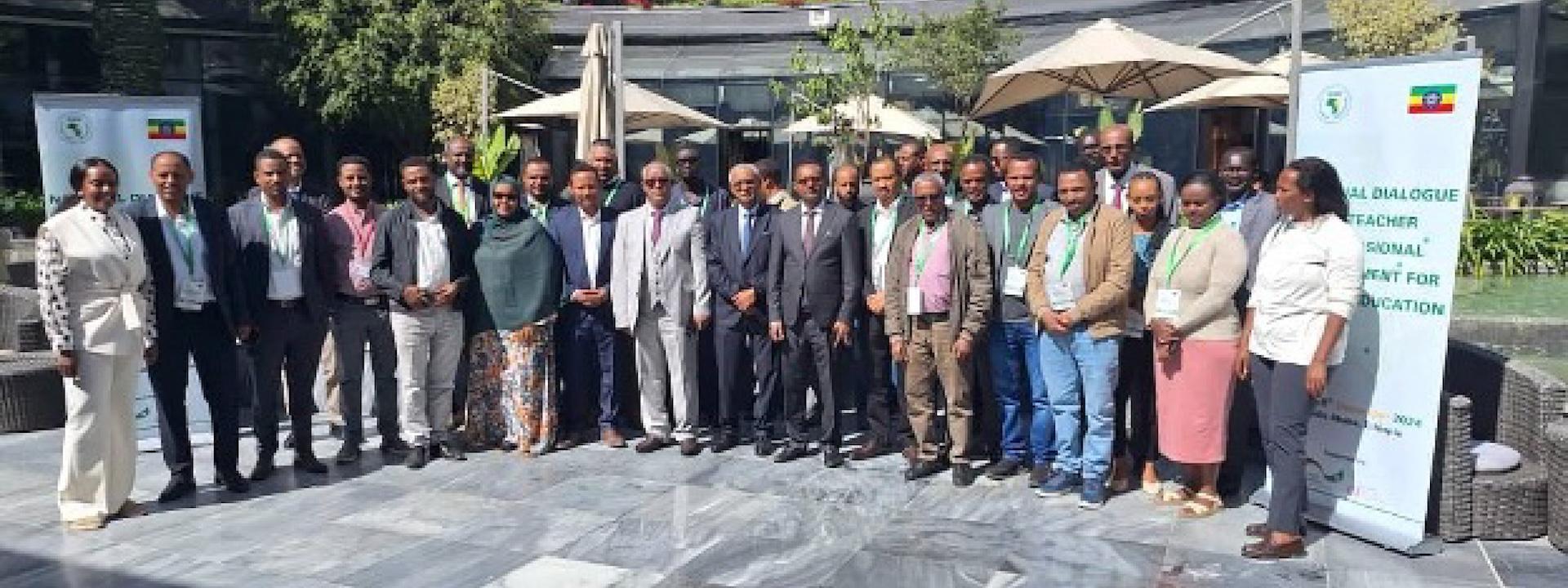December 20, 2024 (Addis Ababa, Ethiopia): The Intergovernmental Authority on Development (IGAD) held the Ethiopia National Dialogue on Teacher Professional Development for Quality Education in Addis Ababa, Ethiopia.
The primary objectives of the three-day National Dialogue were to foster a shared understanding of the importance of continuous professional development for teachers at all levels in Ethiopia, agree on the modalities for a regional Teacher Training Program, and mobilise support from national partners and stakeholders.
Speaking on behalf of Madam Fathia Alwan, Director of the Health and Social Development Division at the IGAD Secretariat, Dr. Kebede Kassa Tsegaye, Senior Coordinator for Education, Science, Technology, and Innovation at IGAD, highlighted key milestones achieved since the adoption of the Djibouti Declaration in December 2017. These include the IGAD Teacher Training Initiative, the IGAD Council of Higher Education, the IGAD Regional Scholarship Program, the IGAD Regional Qualifications Framework, and the IGAD Monitoring and Evaluation Framework.
Dr. Kebede further emphasised Ethiopia’s commitment to the principles outlined in the Djibouti Declaration, particularly the inclusion of refugees in the national education system.
“I would like to commend the Government of the Federal Democratic Republic of Ethiopia for initiating the development of the National Qualification Framework, which aligns with the IGAD Regional Qualification Framework. Additionally, I appreciate the government’s efforts in creating a costed plan of action to implement the Djibouti Declaration,” he noted.
In his opening remarks, Dr. Theodros Shewarga, Chief Executive Officer for Curriculum Development at the Ministry of Education, Ethiopia, underscored the pivotal role of continuous professional development in reforming the education system.
“Continuous professional development is a cornerstone of reforming our education system, securing adequate resources, enhancing quality assurance mechanisms, and investing in our teachers. Teachers are key enablers of quality education as they implement the intended curriculum to achieve student learning outcomes,” Dr. Theodros stated.
Berhanu Genetu, Associate Education Officer at UNHCR, affirmed UNHCR’s long-standing commitment to the Djibouti Declaration, which dates back to its inception in 2017. He highlighted findings from recent research commissioned by IGAD and UNHCR, which assessed progress towards the Declaration’s objectives.
“The research revealed significant achievements by IGAD Member States, with support from various partners, while also identifying areas that require further effort. UNHCR remains committed to working closely with IGAD, the Ministry of Education, and other stakeholders to achieve these goals,” he stressed.
On behalf of Samatar Natalis, Head of the Strengthening IGAD Migration Policy Implementation (SIMPI) Project at Deutsche Gesellschaft für Internationale Zusammenarbeit (GIZ) GmbH, Mr. Patrick Nabwel, Advisor for Jobs, Livelihoods, and Self-Reliance, reiterated Germany’s steadfast support.
“As a long-term partner, Germany is dedicated to supporting IGAD and its Member States in advancing educational initiatives aligned with our shared objectives. Through German Development Cooperation, we are actively involved in strengthening educational frameworks and enhancing teacher training throughout the region. Dialogues like this are vital for monitoring and evaluating the progress of teacher professional development in Ethiopia and beyond,” he noted.
The National Dialogue brought together key sectors of the Ethiopian Government, facilitated by the Ministry of Education, alongside representatives from UNHCR, GIZ, and the IGAD Secretariat. The IGAD Teacher Training Initiative workshop was financed by GIZ.
The dialogue concluded with a shared understanding among participants, enhanced collaboration with various stakeholders, and an agreement on the way forward.
Since the adoption of the Djibouti Declaration and its Plan of Action in 2017, IGAD has played a critical leadership role in promoting access to quality education for refugees, returnees, and host communities across the region.

